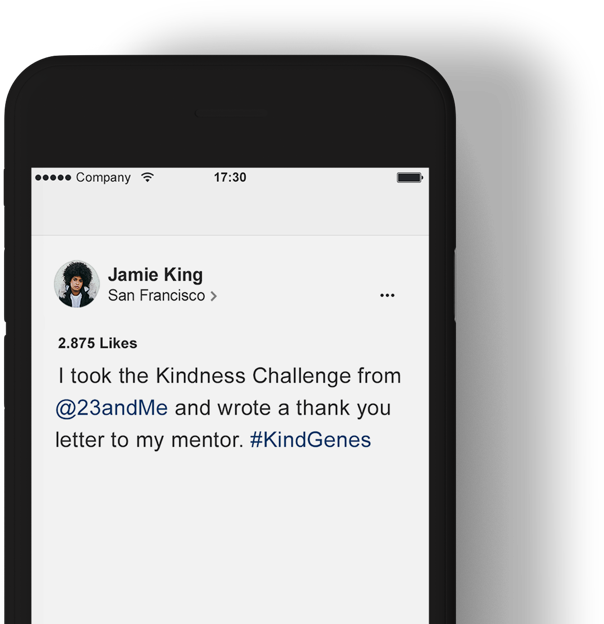KINDNESS IS IN OUR GENES
It's what we need in 2019.
Science shows the potential for kindness lives within us, which is why 23andMe and Kindness.org have teamed up to spread the word that everyday acts of kindness are a choice and require action.
In fact, kindness is in our genes. That's right, according to several studies conducted over the past decade, kindness has a genetic component. At least some aspect of altruism and empathy is hereditary and it's written in our genes - our DNA. But genetics are just one part of the story. DNA is one of many factors that contribute to how we treat each other, along with social, environmental and cultural factors. That means that we have the capacity for kindness - but it's up to each of us to express it.
That's not all. Kindness is not only good for the world, it can be good for your health too. According to Kindness.org, acts of kindness have the power to affect our health and boost our happiness. Research has even shown that kindness may help beat the common cold, lower blood pressure and much more. It's good for everyone in 2019.
Science shows the potential for kindness lives within us, which is why 23andMe and Kindness.org have teamed up to spread the word that everyday acts of kindness are a choice and require action.
In fact, kindness is in our genes. That's right, according to several studies conducted over the past decade, kindness has a genetic component. At least some aspect of altruism and empathy is hereditary and it's written in our genes - our DNA. But genetics are just one part of the story.
DNA is one of many factors that contribute to how we treat each other, along with social, environmental and cultural factors.
That means that we have the capacity for kindness - but it's up to each of us to express it. That's not all. Kindness is not only good for the world, it can be good for your health too.
According to Kindness.org, acts of kindness have the power to affect our health and boost our happiness. Research has even shown that kindness may help beat the common cold, lower blood pressure and much more. It's good for everyone in 2019.


you did to be kind.


- Curry, O.S. (2017). Why are we kind? Kindness.org. https://medium.com/kindlab/why-are-we-kind-ca898dd2c840
- Curry, Rowland, et al. (2018). "Happy to help? A systematic review and meta-analysis of the effects of performing acts of kindness on the well-being of the actor." Journal of Experimental Social Psychology. https://www.sciencedirect.com/science/article/pii/S0022103117303451
- Knafo A. and U. F. (2012). "Variation in empathy: the interplay of genetic and environmental factors, in The Developing Infant Mind: Integrating Biology and Experience." Guilford Press.
- Lewis, G.J. and T.C. Bates. (2011). "A common heritable factor influences prosocial obligations across multiple domains." https://www.ncbi.nlm.nih.gov/pmc/articles/PMC3130221/
- Rakel et al. (2009). "Practitioner empathy and the duration of the common cold." Family Medicine. https://www.ncbi.nlm.nih.gov/pubmed/19582635
- Rowland, L. (2018). "Kindness - society's golden chain?" The British Psychological Society. https://thepsychologist.bps.org.uk/volume-2018/february-2018/kindness-societys-golden-chain
- Steger, M.F., et al. (2007). "Genetic and environmental influences on the positive traits of the values in action classification, and biometric covariance with normal personality." Journal of Research in Personality.
- Whillans et al. (2016). "Is spending money on others good for your heart?" Health Psychology. https://www.hbs.edu/faculty/Publication%20Files/1526_30511abd-038c-45c6-adcc-90285f6bd629.pdf
References: